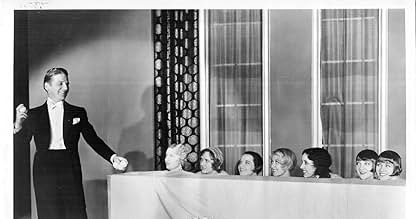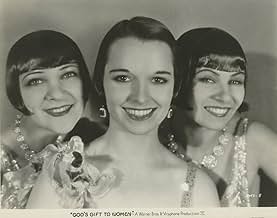अपनी भाषा में प्लॉट जोड़ेंA Parisian descendant of Don Juan vows to stop philandering in order to win the hand of a virtous young lady with a disapproving father.A Parisian descendant of Don Juan vows to stop philandering in order to win the hand of a virtous young lady with a disapproving father.A Parisian descendant of Don Juan vows to stop philandering in order to win the hand of a virtous young lady with a disapproving father.
Tyrell Davis
- Basil, called 'Pompom'
- (as Tyrrell Davis)
Eleanor Gutöhrlein
- Maybelle - Party Girl
- (as Sisters 'G')
Karla Gutöhrlein
- Marie - Party Girl
- (as Sisters 'G')
Ethlyne Clair
- Yvonne - Party Girl
- (बिना क्रेडिट के)
Bill Elliott
- Night Club Patron
- (बिना क्रेडिट के)
फ़ीचर्ड समीक्षाएं
Having read the 700-page biography of Barbara Stanwyck, which only goes up to 1941, I'm not inclined toward sympathy for her first husband Frank Fay, who stars in this Warners bedroom farce. He was arrogant and possibly abusive, and you can see his career in free- fall here. But he's not bad. As an irresistible Don Juan in Paris, which is itself a bit of a stretch, he has a good way with a comic line and is expert at physical comedy. You don't know why Laura La Plante, Joan Blondell, and Louise Brooks, among others, are all fighting over him, but director Michael Curtiz sustains the action nicely, and the Deco costumes and sets are a treat. There's also the nice additional pleasure of a "Show Boat" connection: Leading lady La Plante, who's charming, had recently been Magnolia in the first film version, and Charles Winninger, the stage Captain Andy who repeated his role in the 1936 version, is her dad. He's quite different here, and good.
In this painfully drawn out bedroom farce, set in Paris, Frank Fay is miscast as the titular love object, a descendant of Don Juan, who is smitten with a young American in Paris (Laura LaPlante) but in order to win her must extricate himself from the tangled web of his long- term intrigues with a virtual harem of lovers (played by Joan Blondell, Margaret Livingston, a sadly underused Louise Brooks and others).
The set up is amusing and deftly staged by Michael Curtiz, but once the direction of the plot becomes clear it bogs down in long, boring and insultingly stupid gag sequences, one upon another, involving Fay's diagnosis with a potentially fatal illness; eventually the viewer can only long for this character's demise.
The fine lineup of female supporting players is wasted as are Charles Winninger as LaPlante's suspicious and protective father and Alan Mowbray as (what else?) the butler. Tyrrell Davis gets to wrap the whole thing up with a decadent chuckle, foreshadowing his even more unusual closing moment in "Our Betters" two years later.
Frank Fay's trademark casual banter works against him here because it only adds to the already sluggish pace.
The set up is amusing and deftly staged by Michael Curtiz, but once the direction of the plot becomes clear it bogs down in long, boring and insultingly stupid gag sequences, one upon another, involving Fay's diagnosis with a potentially fatal illness; eventually the viewer can only long for this character's demise.
The fine lineup of female supporting players is wasted as are Charles Winninger as LaPlante's suspicious and protective father and Alan Mowbray as (what else?) the butler. Tyrrell Davis gets to wrap the whole thing up with a decadent chuckle, foreshadowing his even more unusual closing moment in "Our Betters" two years later.
Frank Fay's trademark casual banter works against him here because it only adds to the already sluggish pace.
Of the six or so films Frank Fay made under his early-talkie Warner contract, half wasted time presenting him as some sort of great lover. Battling this concept takes effort and a lapse in sense, not only by the audience, but by the casts of these pictures. This is especially true of THE MATRIMONIAL BED, is less a problem in BRIGHT LIGHTS, but might have reached the ludicrous in GOD'S GIFT TO WOMEN if not for the sensational women involved. Cast as a descendant of Don Juan (annoyingly called "Toto"), it is a testament to the female talent that there is still a lot of fun to be had despite the fact that Frank Fay seldom shut's his mouth. Though the script hardly gives anyone a chance, Fay's incessant chattering "style" is only matched once, when the savvy Joan Blondell fairly bursts into the man's boudoir -- a brief example of sophisticated bedroom farce. This sequence is followed by another gem, a most unexpected three-way battle over Fay; a sexy brawl taking place atop his bed involving ALL QUIET/WESTERN FRONT'S buxom Yola D'Avril, Miss Blondell, and the legendary and stunningly gorgeous Louise Brooks. Yes, Louise was thrown to the dogs in talking pictures, but here is one time (albeit sans bangs) where she looked and sounded sensational for the few moments we were allowed to see her. Nice moments, too, by perfectly capable, delightful silent players: SUNRISE vamp Margaret Livingston, who turns up to give leading lady Laura La Plante a rough moment. La Plante is lovely, and fully up to the challenge of sound comedy. Though hams abound, Alan Mowbray (as the butler), Tyrell Davis (managing to out-fey even Frank Fay), and the fabulous if underused Charles Winninger manage quite effectively. Merely in it for Louise Brooks (and I can't say as I blame you)? Advance to the bedroom romp, but watch the women cavort throughout the opening nightclub sequence -- there are enough glimpses to satisfy. Watch for the beautiful twins from Universal's KING OF JAZZ, the "Sisters G," both of whom are coiffed in what seems to be Louise Brooks' old hairstyle.
During the 1920s, Frank Fay was the highest paid performer in vaudeville, the comedian from whom Jack Benny candidly admitted he lifted his on-stage style. By 1931 when "God's Gift to Women" was released, he had married Barbara Stanwyck and groomed her for stardom while his own career was rapidly declining. An arrogant drunk with a flair for alienating his fellow performers, Fay's downfall didn't get much sympathy though it purportedly inspired the movie, "A Star is Born." For more than a decade, he was the classic example of a "used-to-was" until the producers of the Broadway play, "Harvey," tapped him to play Elwood P. Dowd. It was among the most memorable stage performances I've ever seen, a classic of fey (sic) whimsy and superb comedy timing. Jimmy Stewart in the screen version, couldn't come close. Suddenly, a far less arrogant Frank Fay was enjoying the accolades that had eluded him since the late 1920s. Watch "God's Gift to Women," a stiff, stilted early pre-code romantic romp and you'll see both why Fay's career went downhill and conversely why he had the ideal vaguely befuddled style to play a man with a six foot tall rabbit as a pal.
"God's Gift to Women" is nowhere near a star turn for Louise Brooks. The movie belongs to Frank Fay, who was a popular Broadway star of light comedies at the time, and the first husband of Barbara Stanwyck. Casting the effeminate Fay as a Casanova was a stretch, but his delivery is quite funny in places. The plot line is pretty predictable stuff, but there's a sweet little twist in the final scenes.
Laura La Plante, a tall, rangy Missouri beauty, has the female lead. She successfully made the transfer from silents to talkies. La Plante is charming, and she is photographed to best advantage.
Tenth billing. This is what Hollywood did with Louise Brooks in the early 30s, even after she had made "Pandora's Box" and "Diary of a Lost Girl," the two German films which assured her immortality. But very few Americans had seen those movies at all in 1931, and those who had saw only heavily censored versions.
Very little has changed in Hollywood in the past nearly 80 years. Consider Adrien Brody, whose Oscar netted him Diet Coke commercials, and Halle Berry, whose Golden Boy landed her roles in screen gems such as "Gothika" and "Catwoman." Hollywood punished Louise Brooks for being an independent thinker. Yet she makes the most of her 4-5 minutes' screen time in "God's Gift to Women." As always, you simply can't take your eyes off her.
Laura La Plante, a tall, rangy Missouri beauty, has the female lead. She successfully made the transfer from silents to talkies. La Plante is charming, and she is photographed to best advantage.
Tenth billing. This is what Hollywood did with Louise Brooks in the early 30s, even after she had made "Pandora's Box" and "Diary of a Lost Girl," the two German films which assured her immortality. But very few Americans had seen those movies at all in 1931, and those who had saw only heavily censored versions.
Very little has changed in Hollywood in the past nearly 80 years. Consider Adrien Brody, whose Oscar netted him Diet Coke commercials, and Halle Berry, whose Golden Boy landed her roles in screen gems such as "Gothika" and "Catwoman." Hollywood punished Louise Brooks for being an independent thinker. Yet she makes the most of her 4-5 minutes' screen time in "God's Gift to Women." As always, you simply can't take your eyes off her.
क्या आपको पता है
- ट्रिविया(at around 23 mins) It is interesting to note that the characters played by Billy House and Tyrell Davis are discussing Toto's mental state while using a "pissoir", or public urinal, on a street in Paris. At the time of this film the city had over 1,200 such structures.
- गूफ़On a map, Toto points out the locations of Cannes and Monte Carlo in the north of France on the coastline of the English Channel. Both cities are in the south of France on the Mediterranean coast.
- भाव
Tania Donaliff: [refering to her trip to Africa] But I could never stand intense heat for long.
Diane Churchill: Then the place I had in mind for you wouldn't do at all.
Tania Donaliff: No. Huh?
[chuckles]
Tania Donaliff: Charming.
टॉप पसंद
रेटिंग देने के लिए साइन-इन करें और वैयक्तिकृत सुझावों के लिए वॉचलिस्ट करें
विवरण
- रिलीज़ की तारीख़
- कंट्री ऑफ़ ओरिजिन
- आधिकारिक साइट
- भाषाएं
- इस रूप में भी जाना जाता है
- The Devil Was Sick
- फ़िल्माने की जगहें
- उत्पादन कंपनी
- IMDbPro पर और कंपनी क्रेडिट देखें
बॉक्स ऑफ़िस
- बजट
- $2,22,000(अनुमानित)
- चलने की अवधि
- 1 घं 12 मि(72 min)
- रंग
इस पेज में योगदान दें
किसी बदलाव का सुझाव दें या अनुपलब्ध कॉन्टेंट जोड़ें






































